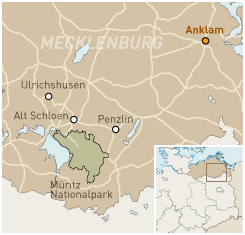The mechanisation of agriculture
On the 31st of January in 1883, the corporation "Pommersche Zuckerfabrik Anklam" was founded. This factory and other sugar
refineries signify of a profound change in agriculture - a change towards industrialisation that culminated at the end of
the 19th century just at a time when the sugar-beet farming had been well-established. It is here that the two developments
interlock. The ordinary beet was cultivated to create the sugar beet containing 17 per cent of sugar. Besides, the first sugar
refineries were built, based on agricultural cooperative societies. In the years 1836 and 1837, 26.000 tons of beet were processed -
at the end of the century this number had already increased up to ten million.
The farms benefited from the sugar beet: It supplied them with higher revenues than before. But it also posed new challenges to the way that the farmers worked, especially on how they treated their soil. But in particular the opening of the potash deposits in Germany and the establishment of nitrogen fertilisers provided the industry with more ways to make the soil even more productive. With time, the intensification of the animal and plant production as well as the use of machines did both transform the structure of agricultural production sites from small farms to large-scale farms.
The farms benefited from the sugar beet: It supplied them with higher revenues than before. But it also posed new challenges to the way that the farmers worked, especially on how they treated their soil. But in particular the opening of the potash deposits in Germany and the establishment of nitrogen fertilisers provided the industry with more ways to make the soil even more productive. With time, the intensification of the animal and plant production as well as the use of machines did both transform the structure of agricultural production sites from small farms to large-scale farms.
Anklam
Overview The mechanisation of agriculture A cultural product: The sugar beet The sugar market regulations of the European Union Master of the sugar: Ingo Kuchenbrandt
